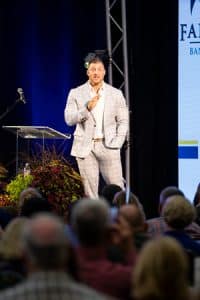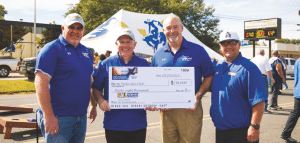For generations of students, Orval Childs, an agriculture professor for 34 years at Southern State College, served as a popular and profound mentor whose influence is still felt among alumni who consider themselves “Orval’s Boys.”
“My dad was my best mentor,” said Jim Baker, Faulkner County judge and a 1968 graduate of Southern State’s business program, “but Mr. Childs was the second-best. He was as good a mentor as you could ever hope to have.”
Being known as one of Orval’s Boys is not only meaningful to Mr. Baker but also to Gary Golden (1968- 1970), vice chair and CEO of First State Bank of De Queen. “Mr. Childs was instrumental in many lives. He offered a path to college for boys who otherwise could not have considered it.”
Orval’s Boys, which Golden described as the composite name for the students who worked on the college farm and lived in Childs Hall during the professor’s tenure, formed relationships that have endured across the decades.
Childs served at Magnolia A&M from 1942-1950 and Southern State College from 1951-1975. He operated the farm, putting students to work whenever and wherever he could. He recruited students at county fairs, where Baker’s grandfather first met him.
“When I was introduced to Orval, I called him Mr. Fair Child, because that’s what my grandfather called him,” Baker said. “He corrected me on that.”
Though remembered as a stern taskmaster, Childs inspired his students to work hard and succeed. Golden recalled working on the farm for Childs.
“We’d milk about 90 cows a day, twice a day,” Golden said. “It was basic farm work. We would get up at 3:30 a.m., get the barn ready, milk the cows, then have breakfast. At 8:00, we’d go to class. I remember Monty Harrington’s dad teaching a 90-minute lecture. There we were, having been up since 3:30, listening to a lecture on bugs! We had to sit together to keep each other awake.”
Golden said the college sold the milk. “It was an income- producing farm,” he explained. “We’d sell slaughter hogs to a packing plant in the Magnolia area. We bought grain, stored it in the bins and mixed our own feed for dairy cows. We were self-sufficient; students did all the labor.”
Childs was there to provide jobs and advice across an array of subjects.
“He basically found a way for a collection of guys from the country to go to college,” Golden remembered. “There was always work on the farm. If you needed a job, Mr. Childs would create one.”
Baker arrived at Southern State College from Glenwood, Arkansas, in 1964. A Mulerider football walk-on, he received a scholarship in the beginning of his second semester. “Mr. Childs was tough on athletes,” he recalled, “but I formed a strong bond with him.”
He remembered visiting other colleges before choosing Southern State. “They all asked me about my transcript and financial condition,” he said, “but at Southern State, the first thing they asked was if I’d had supper yet. That made the difference.”
Baker recalled Childs never bringing a textbook to class. “He taught from experience. He always said that most books were obsolete by the time they were published. He believed that most people who were successful in agriculture were good at adjusting to change.”
Childs took his students on field trips to Texarkana, Bradley and Lewisville, showing them the latest advancements in agriculture. “He said all those places were 10 years ahead of us, and he wanted us to see those innovations.”
Baker said the poultry industry in western Arkansas was developed with the help of Orval’s Boys, including Leland Tollett, former president of Tyson Foods, who received a two-year degree from SSC before earning B.S. and M.S. degrees in poultry science and nutrition from the University of Arkansas.
“You could not major in agriculture at SSC in those days,” Baker said. “After two years, you had to transfer out to get your degree in agriculture.”
Childs knew that families could live on the income produced by cattle and poultry. “He saw a lot of his students come from some pretty tough places, but he tried to accommodate them and help them move forward,” Baker said.
Childs was inaugurated into the first class of the Arkansas Agricultural Hall of Fame. “Many of his former students nominated him for the distinction,” Baker said, “and many have followed him into the Hall of Fame since then.”
Childs was also recognized by the Arkansas Poultry Federation for his dedication to youth and received a State of Arkansas Certificate of Merit for Distinguished Service. He received SAU’s Distinguished Alumni Award and was recognized as an “Outstanding Arkansan” by the Arkansas Electric Cooperation for 33 years of Leadership. In 1973, he was named the Progressive Farmer magazine’s Man of the Year in Service to Agriculture in Arkansas.
The lives of Orval’s Boys have long been intertwined. “We’ve all maintained relationships over the years,” Golden said. “The common denominator was that we came from modest backgrounds, and Mr. Childs gave us the opportunity to better our lives.”




